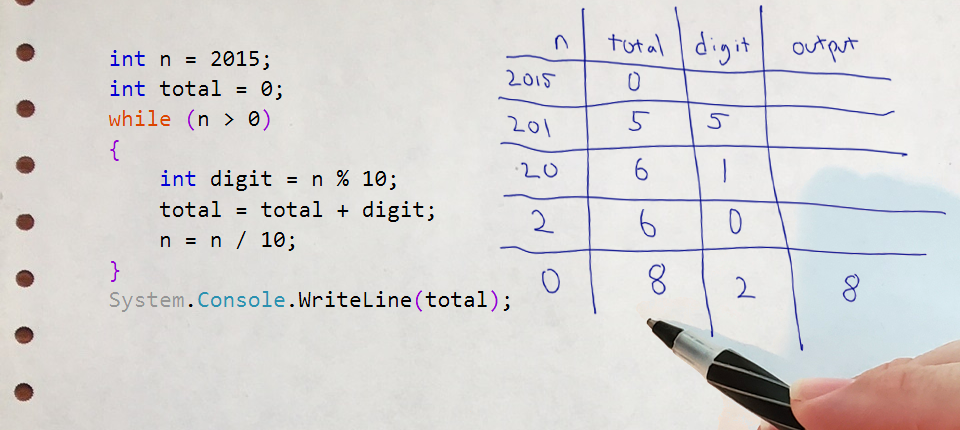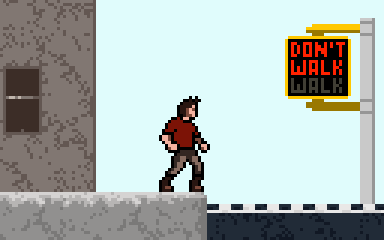The Omniverse
Introduction
Back in 2006, a former thomashapp.com attempted to explain the nature of our reality and its ramifications. Nobody read it, then the code running my site was deprecated and it went down. So I’m trying again, now with pictures.
Summary
A “reality” is an algorithm operating on a set of data, and all possible such algorithms exist. They will seem “real” to any thinking entity they describe.
Explanation
Let’s say we’ve got a human being (and all the required biology, etc.) running inside a computer.
The human doesn’t know he’s in a computer. He just reacts to the world around him like you or I. This is a picture of him waiting at a crosswalk.
But here’s the thing - we know his computer code. So, without even using a computer, we could figure out what he does just by tracing the the code by hand, keeping a tally of the variables on paper.
An example code trace of much simpler program
It takes a long time to do (years, decades, centuries), but in the end, we can determine the output (he realizes he forgot to turn off the oven and goes back), just as if he were run in a computer.
Where is his conscious process happening here? We figured out what the result was, but did his actual thinking happen on the paper?
A bunch of code printed out and catching fire.
Say that we have been tracing our simulated human some time now (using lots and lots of paper). Then a warehouse fire destroys half of the records. If his consciousness is tied to the paper, did he die? If you resume tracing his code from “backup”, is it a different person with a different life now? From his perspective, nothing has changed. He doesn’t know there was a fire.
It’s almost like his consciousness is a separate thing from our computation, which our tracing the code lets us watch like a movie, but whether we trace it or not, it still occurred. Do we even need to have written the code at all?
Before the advent of computers, mathematicians developed written models such as Turing machines and lambda calculus to “run” programs. While it may seem like the computer is somehow imbuing programs with life, making them “real” by sending electrons through complex physical logic gates, to a human described in such a program, there is no difference.
Let’s take it further. What if we replaced all the variables in our code with every possible number/value, for billions upon billions of iterations? Eventually we'd arrive at the working code for our simulated human. And any number of other worlds, some with simulated beings - observers, if you will - and some without. But like our example simulated human, these worlds all seem real to those observers, whether or not we go through the exercise of generating the values.
Furthermore, in computers (and Turing machines), algorithms themselves can be represented in memory as numbers or symbols. So we could use this to trace all possible algorithms with all possible variables just by plugging in every possible value. Any observers described by these algorithms may each consider theirs to be the one “real” universe because it has the collection of attributes needed for them to have evolved and survive, perhaps thinking it was made just for them. But this is like survivorship bias - they are all real.
The “Omniverse”
I’m going to refer to the combination of an algorithm and its starting variables as a reality, because all possible variations of these exist and feel “real” to any observer they describe. And our reality is one of them. (I could use the word “program” but for most people this has the implication of being “in a computer”, which would only sometimes be the case).
The word “universe” is generally used to mean all of space and time, but that description only applies to our own very specific kind of reality. So what do you call this collection of all realities, most of which won’t necessarily have space or time as we understand them? The word “multiverse” is typically associated with the many worlds interpretation of quantum mechanics, which is still specific to our particular kind of universe, so I’m going with omniverse until something better comes along.
It might be hard to wrap your head around the idea that a humble algorithm is a real and concrete world without needing something outside of the system to create it it, so here is an analogy: Think of how it’s true that 27 + 44 = 71 whether or not anyone ever added these two amounts together before. And how it’s true that the summing the digits of “2015” comes out to 8, whether or not anyone ever bothers to run a program to calculate it. So likewise it’s true that with our laws of physics and its starting values (which progress like an algorithm), you get our universe and you reading this blog - whether or not you’re in a computer simulation or code trace.
I’ll make a note here, since I don’t know where else to put it: I typical reaction I get when explaining this is that there must be something “physical” performing the simulation for the beings within to observe it. The thinking goes that even with a code trace, Turing machine, or lambda calculus, the calculation is ultimately performed by a human mind made of constituent atomic particles. So while the particles of the simulated human are “virtual”, the particles of the person doing the computation are “physical”. Instinctively I feel that this is introducing unnecessary complexity, but I don’t think it can ever be disproven, much like religion or magic can’t be disproven. But it perhaps would be discouraged with this thought experiment: Suppose there is a one, true, “physical” world. Eventually it reaches the technological state to be able to run a simulation of sentient beings, who then run their own simulations, ad infinitum, recursively. In every case the beings simulated suppose that they are living in the one, true, “physical” world and that those it simulates are “virtual”. But in actuality the probability of being at the “root” node of this tree of simulations is infinitesimally small. I feel this would be the case with us, and if indeed there is a “true” physical world, we are not it.
Conclusion(?)
The classical notion is that all reality is a singular thing defined by a big bang, a lot of swirling galaxies, and a particular (if strange) set of physical laws, but this is ultimately geocentric. In truth, ours is just one reality among infinite others - an algorithm and a particular set of data that happened to have the attributes needed for us to survive. Our forebears taught us that it is the one and only reality, but this is the result of a kind of survivorship bias. There are actually an infinite number of other realities, a percentage of which have thinking entities, each observing and possibly trying to make sense of the algorithm that describes them.
In my next post I speculate as to why we might be observing this particular reality, and how the probability of existing in a certain kind of reality could be manipulated. It’s up now, thanks for your patience.





